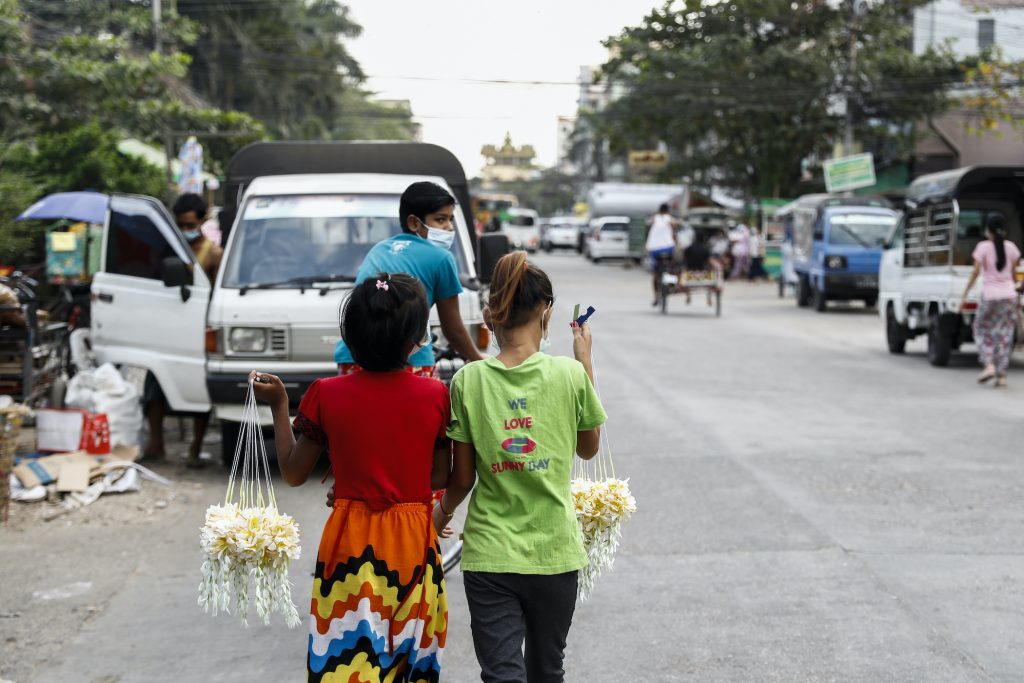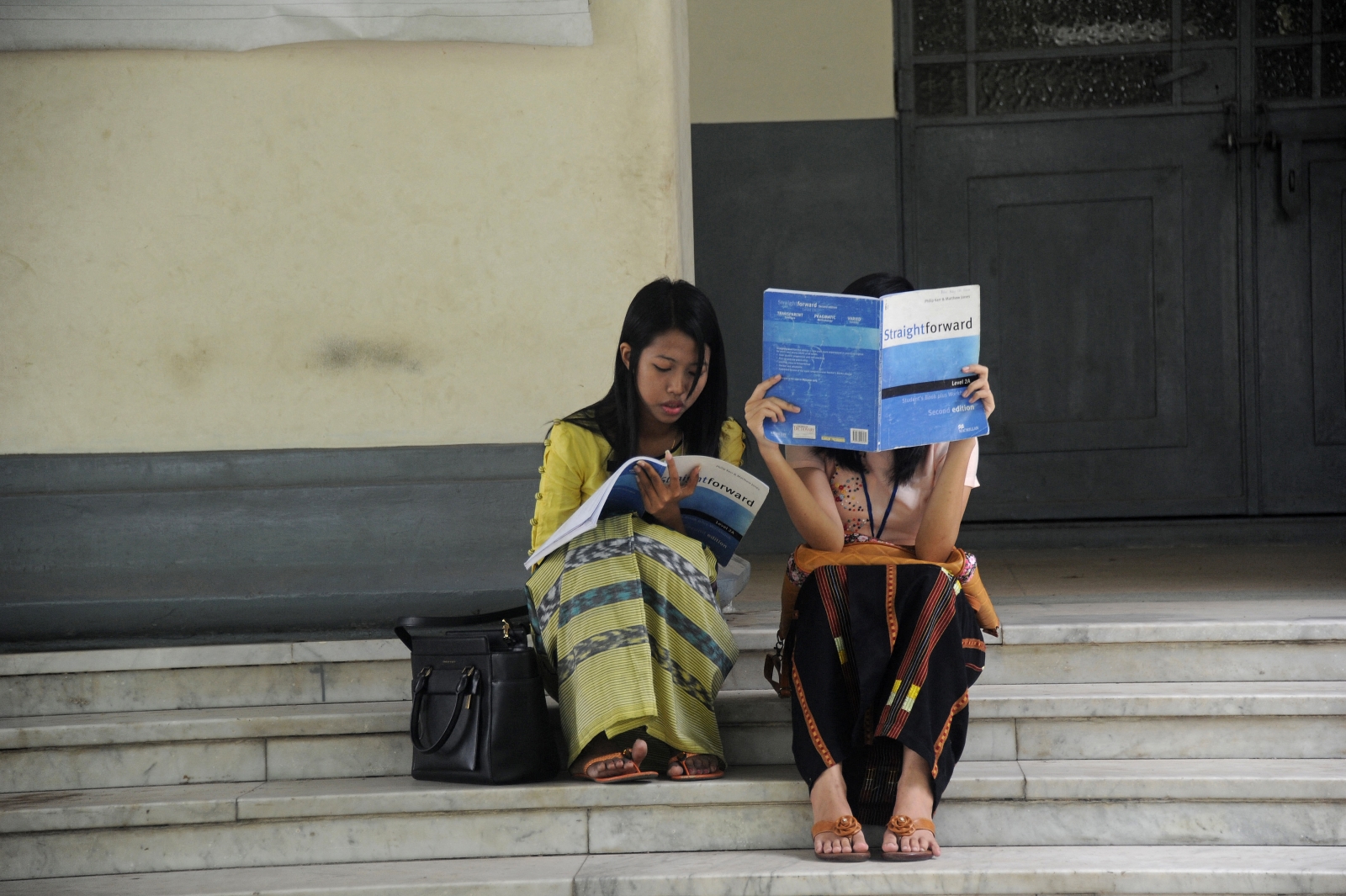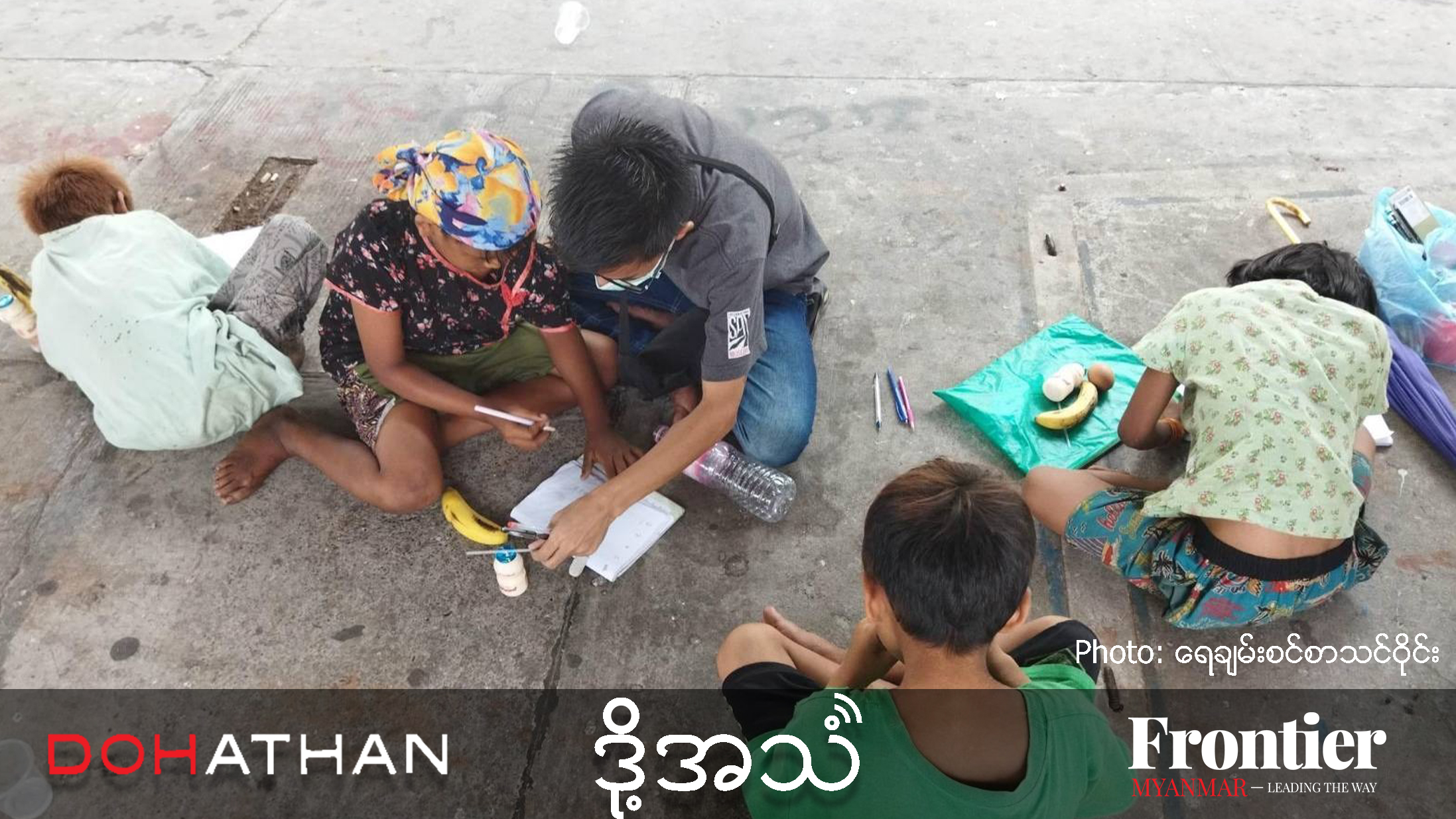Financial hardship and school closures due to the pandemic have pushed many more children into the workforce, and experts fear they may not return to class when schools eventually reopen.
By SWE LEI MON | FRONTIER
This article is from the January 28 issue of Frontier
Every day at about 4pm, 12-year-old Ma Wai Wai and Ma Nge Htway, 11, take a bus from their home in Hlaing Tharyar, the industrial township on Yangon’s outer-western fringe, across the Hlaing River into Hlaing Township. There, at the Bartar bus stop, they receive strings of flowers from a wholesaler to sell on the streets for between K400 and K500 each.
They usually begin selling at the Bayintnaung market, the largest produce market in the city, in Yangon’s north-central Mayangone Township. As night closes in, they focus on the streets surrounding the market. Shoppers, drivers and vendors buy the flowers to hang from their stall or rearview mirrors, or to make Buddhist offerings with. The children return to the wholesaler at the end of the night with the money they’ve made, and the wholesaler pays them between K1,500 and K2,000.
Fair skinned and wide eyed, Wai Wai never expected she’d become her family’s main breadwinner shortly after finishing Grade 6. Ten months ago, when the 2019-20 school year ended, she would spend her evenings babysitting her two younger brothers (in July, her mother gave birth to a third) and playing with the other kids in the informal settlement in Hlaing Tharyar’s Shan Kyaung ward where she and her family live. Her father was a day labourer, doing yard work and cleaning the homes of wealthy neighbours in the nearby FMI City and Nawaday housing complexes.
But when the COVID-19 pandemic hit Myanmar, wealthy homeowners became wary of interacting with outsiders – especially those living in the cramped quarters of Hlaing Tharyar. His clients no longer wanted him in their homes, or even their yards, and the work vanished.
“Not long after my [Grade 6] exam, my father stopped making enough to feed us,” Wai Wai told Frontier on December 21. “Nobody wanted to hire him because they were scared of COVID-19. My mom was pregnant then, and she couldn’t find work either.”
At the end of April, Wai Wai – the family’s eldest child – decided to shoulder the burden herself.
“A woman who used to live in our squatter area came to find two girls who would sell flowers at night. She said we have to sell the flowers by walking around in the city wards, and my neighbour Nge Htway and I decided to do it,” she said. “Usually we have to sell until 9pm to finish all of the flowers, and by then the bus has finished running, so we have to take the illegal buses home.” Throughout Yangon, unlicensed buses known as “outside cars” carry workers needing transport outside of the normal operating hours of the city’s official bus service.
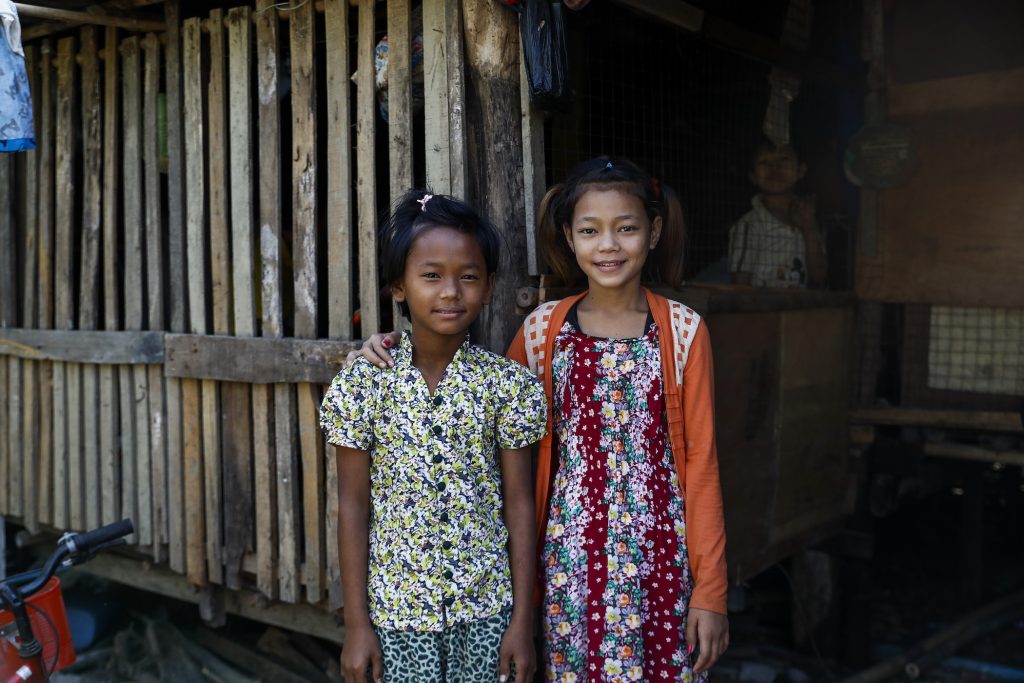
Ma Nge Htway, 11, left, and Ma Wai Wai, 12, have been selling flowers to make up for income their parents have lost during the pandemic since April. (Nyein Su Wai Kyaw Soe | Frontier)
As the COVID-19 second wave that emerged in Rakhine State in August has dragged on into 2021, Yangon’s streets have swelled with small children begging on streets and vending goods at traffic lights. The government does a poor job of collecting data on child labour in Myanmar, but with schools closed and household budgets stretched thin, poor families seem to be increasingly turning to children to make ends meet. With most schools shuttered for close to 12 months, many social workers worry the trend will last beyond their reopening – whenever that may be.
“Very few working children will return to the classroom if the government does not help,” said Daw Win Pa Pa Than, senior programme adviser for the international NGO Save the Children.
‘Now it’s all reversed’
Wai Wai said she’s gotten over her initial fear of walking Yangon’s streets late at night by finding quiet lanes to stick to as it gets dark. But Nge Htway, who is supporting her nine-member household, is still scared. She said drunk men sometimes shout at her, but she now knows which streets they loiter on and has learned to avoid them. She says she has no other choice.
“I’m just thankful I have any work to do at this point,” she said. “Only me and my older sister are earning any money right now. My father had to return his trishaw to its owner four months ago because he wasn’t even earning enough to cover the [K1,300 per day] rental fee.”
But the flowers often don’t bring in enough to keep her whole family fed. With Nge Htway’s income and the K2,500 to K3,500 a day her older sister, 17, brings in cutting fish at a processing plant, the family is living on about K5,000 a day. When the flowers aren’t selling well enough, she tries to work alongside her sister at the fish plant.
“There are a lot of adult workers who want to do that, so there isn’t always work for me,” she told Frontier.
With Nge Htway’s large family struggling to afford basic necessities, her parents have had to take desperate measures. “They had to send my 13-year-old brother to live with relatives in South Dagon Township,” she said, tears beginning to well in her eyes.
Since No. 19 Basic Education High School in Hlaing Tharyar shut down in March, many students have found themselves in a similar position to Nge Htway and Wai Wai, said Ma Khaing Thazin Oo, the mother of two young children in Shan Kyaung.
The 23-year-old, who has worked as a day labourer since she was eight, sold fruit outside the factories of the nearby industrial zone before COVID-19 shuttered the factories too. She said the former schoolchildren of her ward now sell flowers, haul goods at markets and jetties, cut fish and collect trash.
“The kids are doing anything they can for just K500 here or K1,000 there, because the adults cannot find work. Everything – factories and construction sites – they all closed down,” she said. “Before COVID-19, the adults went out and made money, and the children [went to school half the day and] watched the home and kept it safe for the other half. Most of the time, they’d be in the street playing.” With parents home all day and children working, “everything has been reversed”.
‘Another jungle’
For the hundreds of small children that in relatively good times serve food and wash dishes at the city’s restaurants and tea shops, things are bleaker still.
Among low-income households in rural areas, it’s not uncommon to send children to the city to work and live at tea shops so they can earn money to remit back to their families. But the closure of in-house dining due to the pandemic is pushing many of them into more back-breaking work, or has them packing their bags and heading back home to the countryside, where work is likely just as scarce.
When the first wave of the virus hit in March, the government ordered all food shops to offer takeaway-only. Some restaurants were allowed to eventually reopen, only for the second wave to emerge, forcing them to close their doors again. While the policy seems to be selectively enforced, it has forced many restaurateurs out of business.
For the past 15 years Ko Ngwe Lin Tun has helped new teashop owners prepare for opening day by training their staff in the art of making Myanmar tea. He said that while a lot of children have returned to villages, many shop owners have kept their young staff in Yangon, offering them food and board but no salary until they can reopen.
“It’s difficult for shop owners to find new workers when the shops reopen, so they want to hang onto staff,” he said.
He said staff some shops that are still operating on a take-away basis are receiving a third of the normal salaries, but for other teashop and restaurant workers, the shut downs have pushed them into more strenuous work at lower wages.
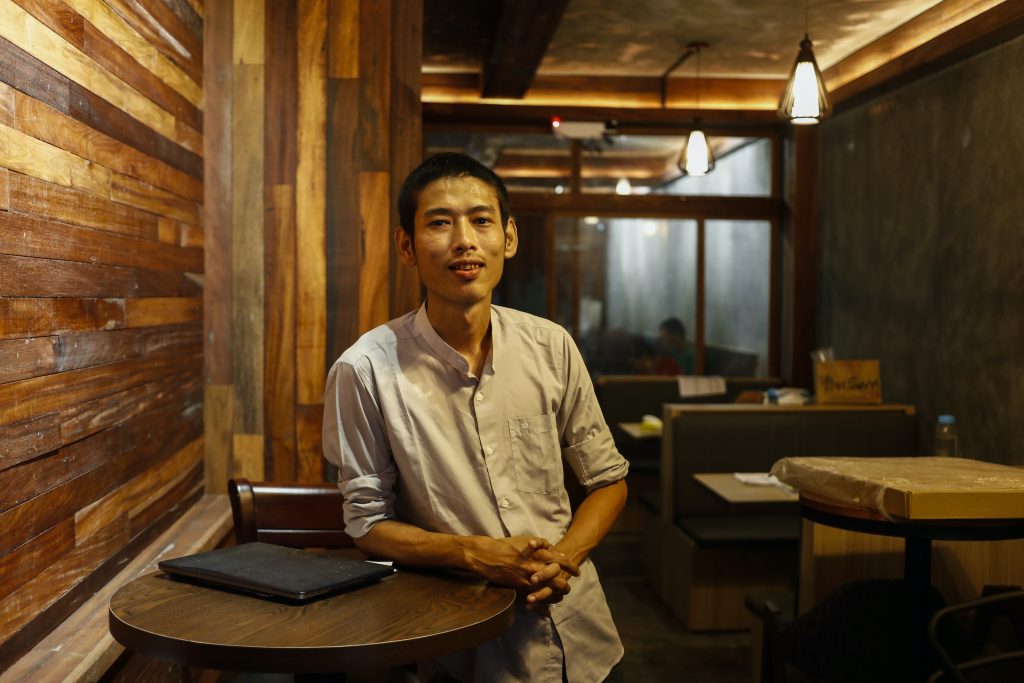
Ko Ngwe Lin Tun, who trains tea shop employees, has seen many children’s wages cut during the pandemic. (Nyein Su Wai Kyaw Soe | Frontier)
When the restrictions were introduced in March, Mg Pyae Phyo, 14, was let go almost immediately because the Hlaing Tharyar beer station he waited tables at had to close. Now he works as a porter at Bayintnaung Market.
“As a waiter I earned a K90,000 monthly salary. Now, as a manual labourer, my income is less stable. The most I can earn is K4,000 a day, but sometimes it’s just K1,500 or K2,000 for the whole day,” he said. “And it’s much harder work. In the beginning, it made my whole body hurt so much.”
Mg Wai Yan, 13, instead chose to return home to Danubyu Township, Ayeyarwady Region, when his North Dagon teashop closed in June. He ignored the owner’s requests to stay on without a salary.
“At first, our teashop ran take-away service for two months and my owner cut my salary by half. Then he decided to close for a while and asked me and another three workers to stay at the shop without a salary, but with the promise of a job once the shop opened again,” the boy told Frontier. “But my family wanted me to come home.”
Now he’s working as a porter and a motorbike taxi driver in Danubyu.
Moving back isn’t always an option, however. Ma Su Myat Myo and her whole family arrived in Yangon from the Ayeyarwady Region village of Ayeyar Tan, in Bogale Township, just days before the pandemic hit. She had just finished Grade 3. Since March, the 10-year-old has been peddling K100 sticks of ice cream at stops along Yangon’s “circle train” and on the streets of neighbourhoods surrounding each stop.
“In the village, we all worked the land, harvesting crops or fishing in the river, but it wasn’t enough. We moved because we’d heard there were more job opportunities in Yangon,” her mother, Daw Win Maw, 38, told Frontier on December 21.
A few days after the family arrived, the city went into full lockdown.
Now Win Maw’s husband loads and unloads sacks of rice and beans at Bayintnaung Market and at nearby jetties, but the work – and his income – is unstable. Cargo has declined with COVID-19-related road closures and travel restrictions.
“Some days he earns just K1,000 a day! How can we survive on that?” said Win Maw. “No parent wants to make their children work, but we can’t help it. We had to make our daughter sell ice cream.”
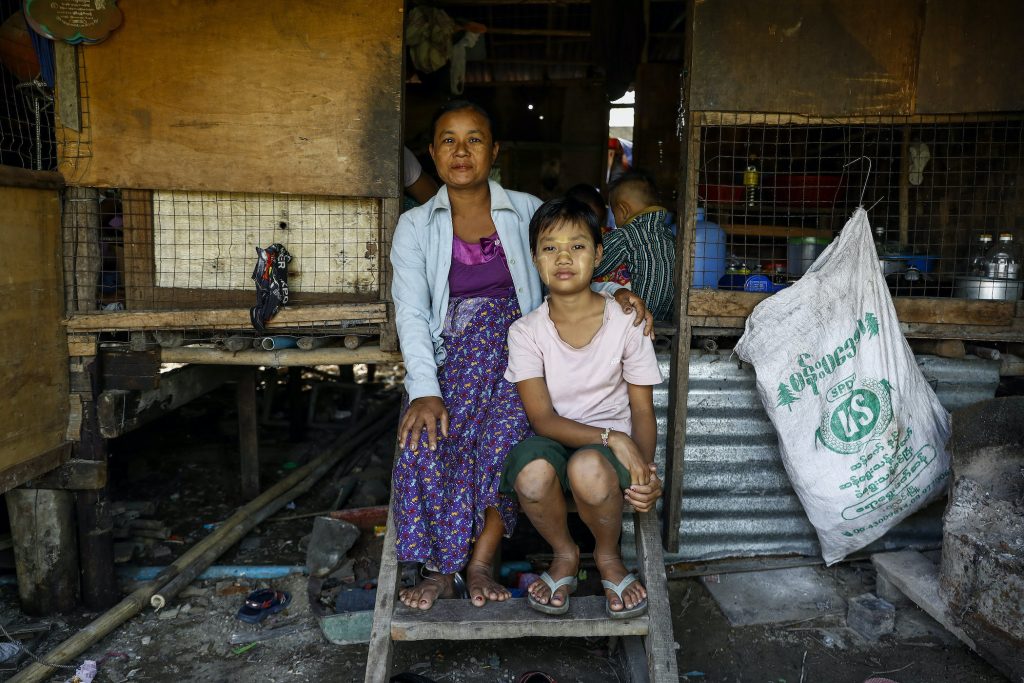
Daw Win Maw, left, has relied on the meagre ice cream sales her daughter Ma Su Myat Myo makes since the pandemic began. (Nyein Su Wai Kyaw Soe | Frontier)
Su Myat Myo buys each stick of ice cream for K60 from a wholesaler in Mayangone, making K40 on each stick sold. If she can sell 100 sticks she makes about K4,000 in profit, but often she doesn’t hit even that meagre goal – and sometimes doesn’t make a profit at all.
“It’s hard to sell right now because few people are taking the train, and besides, it isn’t the hot season,” she told Frontier. “If I don’t make anything today, I’ll have nothing to invest in more ice cream tomorrow, and we’ll have to borrow money from lenders that charge high interest rates. It’s like an endless cycle.”
The family borrows from friends and family, but also lenders in their Hlaing Tharyar ward who charge 10 percent interest every 13 days; Su Myat Myo said the family has taken K300,000 in loans altogether. Meanwhile, their Hlaing Tharyar squat near the Bayintnaung Bridge rents for another K30,000 a month.
It is hardly what Win Maw was hoping for when she moved to Yangon. She said she feels like a stranger in a strange land.
“Have you heard of this proverb, ‘Only a tiger that wants to die moves to another jungle’? This is us,” Win Maw said. “Sometimes I want to go back to the village, but I know it’ll be no different. There are no jobs for us there either.”
Back to school?
Su Myat Myo was a good student. In Ayeyar Tan she was always among the top 10 in her class. Win Maw is committed to sending her back once the schools reopen in Yangon.
“No matter how difficult it is, I will make sure my children get an education,” she said.
Myanmar’s school year runs from June 1 to March 31. While 3,772 of 5,830 high schools passed inspections and were granted permission to reopen on July 21, 2020, they were all closed again in August when the second wave of COVID-19 hit.
On January 5, township-level education departments told schoolmasters to begin preparing for another round of inspections from the Ministry of Health and Sports in preparation for reopening. But at a press conference three days later, president’s office spokesperson U Zaw Htay told reporters the government has not yet set a date for reopening.
Wai Wai is not interested, though. She’s already decided she’d rather keep working.
“My father can’t make enough money to cover our family’s daily needs, and I’m the oldest child. My mum and dad also want me to drop out,” she said.
Win Pa Pa Than from Save the Children said she’s worried many children will follow a similar path. Her concern stems in part from a survey of 300 children around the country that the Child Rights Working Group – a consortium of organisations working on children’s rights – conducted in May and June.
“We found that a lot of children in Myanmar are facing the potential of dropping out of school to continue working because their parents’ livelihoods have been so badly affected by the pandemic,” she told Frontier on January 7.
According to the International Labour Organization, there were already 1.13 million child labourers aged between 5 and 17 in Myanmar before the pandemic, more than 600,000 of whom were working in hazardous conditions. Ko Saw Hsar Ka Baw, project officer of ILO’s Myanmar Programme on the Elimination of Child Labour, said the United Nations agency is still researching the issue and hopes to have more solid data by February. However, it’s certain both numbers will increase once the pandemic’s damage can be more fully assessed, he said.
“It’s already obvious that the amount of the school children permanently entering the workforce is up.”
Win Pa Pa Than said that, without further cash assistance for needy families from the government, many children will continue working whether schools open or not. “If the government doesn’t do anything, the number of children dropping out will increase significantly,” she said.
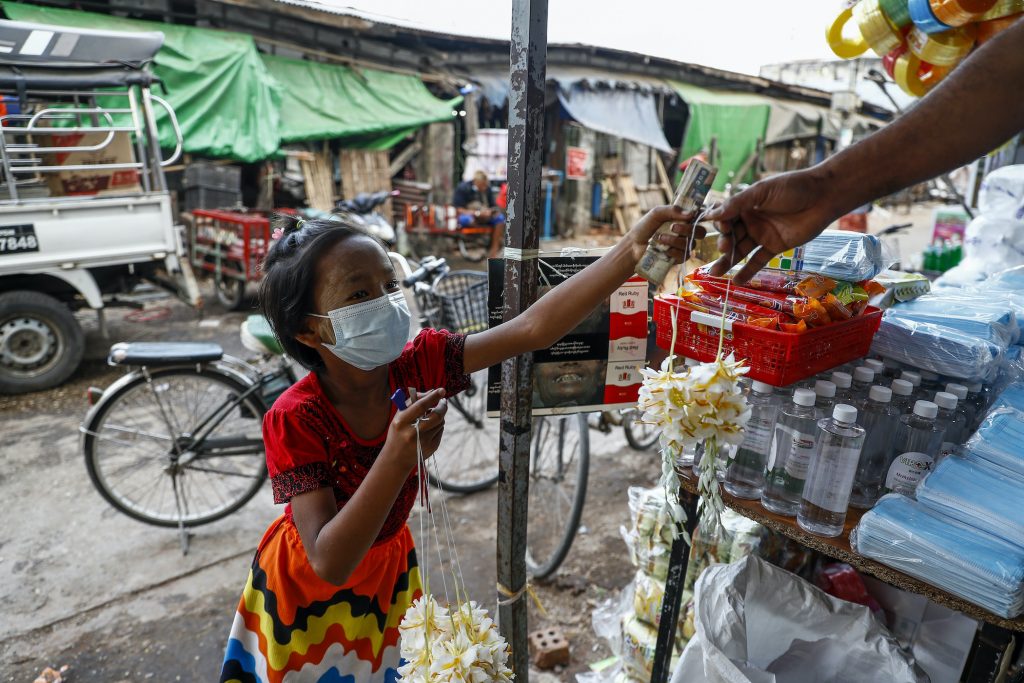
A child sells jasmine on the streets of Yangon. (Nyein Su Wai Kyaw Soe | Frontier)
The ILO also backs a cash-for-education programme. Saw Hsar Ka Baw said it would likely help many children return to the classroom. “In the Philippines, the government paid an amount equal to a working children’s daily wages to families so they’d return. If we [can do likewise], they might go back to school,” he said.
The government has so far announced no plan to help or encourage working children return to school and, according to the Ministry of Social Welfare, Relief and Resettlement, no such plan is being formulated.
Win Pa Pa Than also called on the government to track the number of children in the labour force more accurately.
“We want to urge the government to do more research. We know data collection in Myanmar is weak, but now is an important time to start collecting data on the impact the pandemic is having on children,” she said.
In Myanmar, the minimum working age is 14 years old, according to the 2019 Child Rights Law, but this law is largely seen as existing on paper only, with no real enforcement and with little awareness – particularly among the poor and destitute.
U Kyaw Myo Than, director of the Ministry of Social Welfare, Relief and Resettlement’s Welfare Department, said the government needs to strengthen the law and do more to raise awareness about the rules. “In fact, the law as it is isn’t enough. We need detailed rules and enforcement, so we are writing bylaws now, which we should finish early this year,” he said.
Ngwe Lin Tun, the teashop trainer, said most parents don’t know their childrens’ employers are breaking any laws, and think that having their children work at teashops is the best thing for their future.
“It’d be better if employers hired older workers, but in Myanmar, these children also need jobs,” he said. “This problem won’t be solved until the government can create job opportunities for their parents, and until these parents are aware of and understand the benefits of staying in school.”
Win Pa Pa Than agreed.
“It’s a difficult problem to solve – everyone knows it’s really difficult. But we cannot give up,” she said. “If we do nothing, things will only get worse.”


